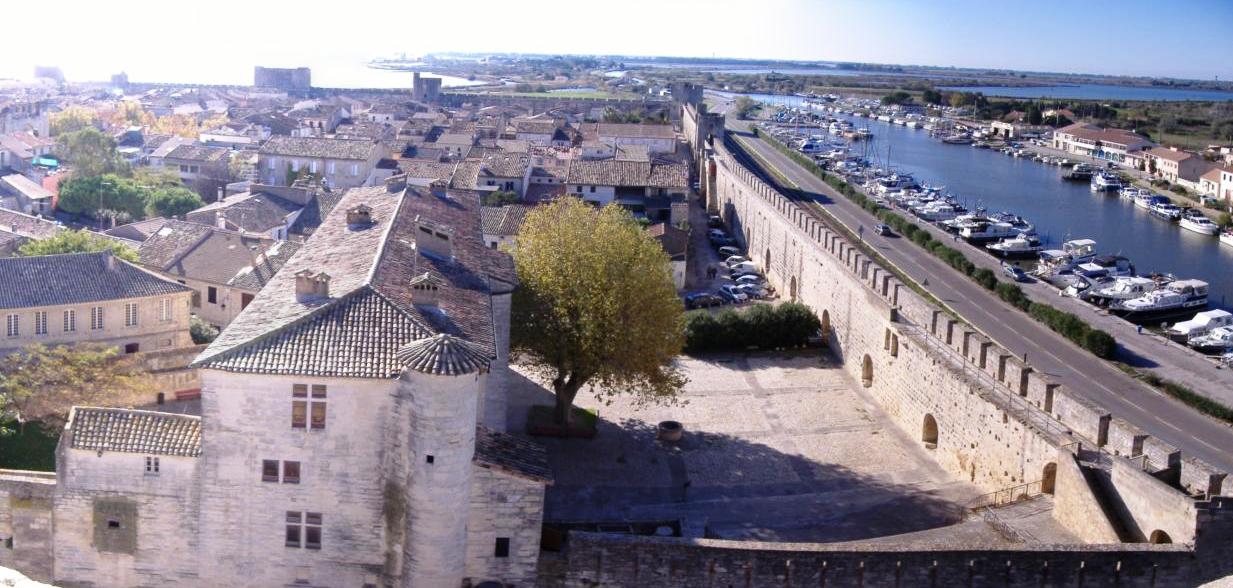Well it didn’t take long for someone to point out to me that I’d left out an important site from my list of agrobiodiversity attractions around Montpellier. That’s of course the beautiful and historic botanic garden, one of the oldest in France. I’m happy to rectify the omission.
Agrobiodiversity tourism alive and well in South of France
I’ve been in Montpellier for the past few days attending what is actually quite an interesting conference, which is just as well because we’re out in a pretty uninteresting suburb. We did get a day off on Saturday, but otherwise we haven’t had much free time. A pity, because perusing the little pamphlets describing different local tourist attractions that one finds scattered around the hotel reveals at least three with interesting agricultural biodiversity angles.
One is a boat tour around the Isles de Stel in the Camargue: salt works, horses, bulls, rice fields, local food, the lot. Plus it starts from the fascinating medieval town of Aigues-Mortes. 1

Or you can visit a buffalo reserve near Sainte-Eulalie. This seems to refer to the wisent, saved from extinction by captive breeding in Poland.
And, finally, there’s La Bambouseraie, near Anduze. It’s a botanic garden, resource centre and nursery dedicated to bamboos that was established in 1856 by Eugène Mazel.
Mazel had made a fortune in trading with spices he directly imported from Asia. This activity allowed him to have plants, practically unknown in Europe at that time, sent to him from these distant countries.
Too bad I’m stuck in this hotel. Although, what with the Air France strike and all, I might get the chance for some sightseeing after all.
Nibbles: Sturgeon, UK, Goats, Bees
- North America’s largest freshwater fish saved from extinction.
- 10 years ago, Britain’s National Trust turned “its biggest managed farm into a gigantic experiment as an antidote to intensive farming” in Snowdonia.
- The origin of the goat investigated.
- Tracking bees.
The Cure of Agues
![]() The Royal Society Digital Journal Archive, dating back to 1665, is freely accessible until 1 February 2009. Enjoy it while it lasts, and read papers by Isaac Newton, Michael Faraday and Stephen Hawking.
The Royal Society Digital Journal Archive, dating back to 1665, is freely accessible until 1 February 2009. Enjoy it while it lasts, and read papers by Isaac Newton, Michael Faraday and Stephen Hawking.
In its announcement, the Society mentions a paper representing an applied biodiversity breakthrough: Edward Stone’s discovery that willow bark cured fevers, leading to the discovery of salicylic acid and later the development of aspirin. It is the best substance I have ever used. 2
In his letter to the Royal Society (and they really were letters back in 1763), Stone explains how he did it. After accidentally (no further explanation) tasting willow bark, and noticing its bitterness, he suspected it might have properties similar to that of the Peruvian bark (i.e., of the cinchona tree, containing quinine). That willows grow in swampy areas was also a reason to suspect its usefulness against agues (malaria and other fevers), following “the general maxim that many natural maladies carry their cures along with them.” I suppose that today this maxim could be used for integrated pest management.
 Then he applies the scientific method. Literature review: no mention of medicinal properties of the willow. Methods: 5 years, 50 persons, dose, comparisons and mixes with quinine, evaluation of side effects. The only thing missing in the 1760s is a control treatment. But who needs a placebo if the medicine never fails to cure?
Then he applies the scientific method. Literature review: no mention of medicinal properties of the willow. Methods: 5 years, 50 persons, dose, comparisons and mixes with quinine, evaluation of side effects. The only thing missing in the 1760s is a control treatment. But who needs a placebo if the medicine never fails to cure?
Great man, great discovery? Well, willow had been in use for millennia, but perhaps Stone did not know, he did not have wikipedia.
The wikipedians also note that the use of willow “was forgotten by doctors in the middle ages but lived on in folk medicine.” This makes the accidental tasting a bit fishy. Sounds to me like the story of a bio-prospector who took off along a winding path, talked to an old lady, and was too vain to acknowledge her. Pure speculation, and I am glad he did the experiments and wrote that letter.
Stone was a terroirist: “Few vegetables are equal in every place; all have their peculiar soils, where they arrive to a greater perfection than in any other place.” Mustard seed from Durham; saffron from particular spots in Essex and Cambridgeshire; cider apples from Herefordshire; valerian from Oxfordshire and Glocestershire.
He gathered his willow bark from trees in northern Oxfordshire, where “soils are chiefly dry and gravelly”. And thus he suspected that stronger stuff could be found in other – moist and moory – parts of the kingdom. A modern genebank manager could have reasoned the same way.
Any other nuggets on agricultural biodiversity in these archives? We have until February to dig for them. After that: please report on all peculiar tasting substances you encounter, particularly if bitter, and whether ingested by accident or not.
Discourse for dinner
This is not just any blog. It is a local blog. Or at least you could pretend I live in your street, and shop in your mall. Does that makes this post more palatable?
It seems to work that way with food. At least where I come from, a dish that is “from our own garden” is supposed to be of high quality, not a sign of poverty. Chad Nilep, in an elegant post on the Linguistic Anthropology blog reflects on the Japanese preference for “naichimai”, Japanese grown rice 3:
Thus (I thought to myself this afternoon), while consuming naichimai, Japanese consumers enjoy not only the material element of the rice itself, but also the melancholic discourses of national nostalgia, imagined though they may be.
But you could also imagine that I live in a far and exotic place where we produce and eat food that you can only envy. Europe is full of that tradition: ham and cheese from Parma, bubbly wine from Champagne. You name it.
Ask for the main discourse the next time you are eating out.